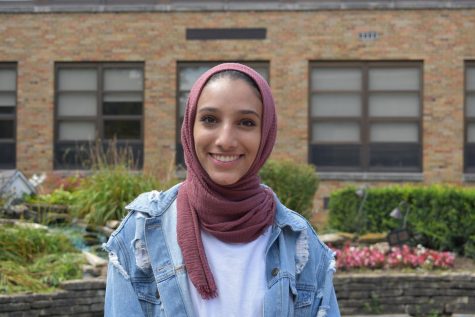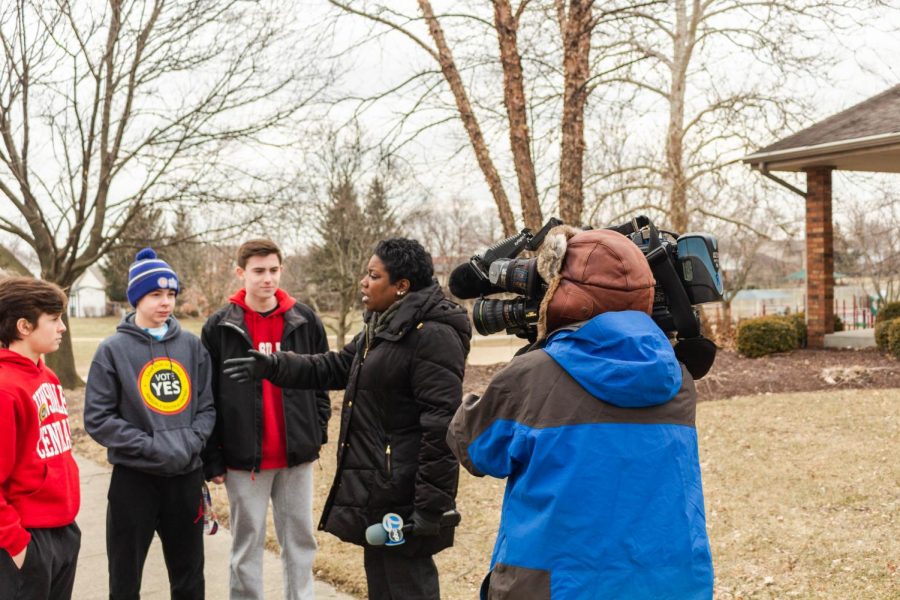Campaigning for April referendum amps up
For many D86 students and parents, the vote for the $166 million referendum in November sparked increasing concern for the future of both Central and South. Even though there were campaigns by both sides for the first vote, Yes for D86, the campaign to approve the referendum, decided to amp up fundraising and campaigning to put up a larger fight to pass the new, smaller referendum on April 2, 2019.
Since early January, the Yes for D86 campaign has organized many events for both awareness and fundraising purposes. Some of their bigger events included the Vote YES! Benefit Concert where two local student bands, The Millenials and TheSpins, performed, as well as their Ruth Lake dinner fundraiser, which raised the most money for their campaign.
The money made from fundraising events and private donations goes to their advertising campaign which includes yard signs, newspaper and digital ads, and printing and mailing fliers. The campaign has run multiple Youtube ads for viewers in this area, which has been a successful way to spread awareness, according to Mrs. Kari Galassi, chairman of the Yes for D86 campaign.
Their social media presence, both on Instagram and Youtube, helps spread the word about why they believe the referendum must pass.
For the earlier referendum in November, the D86 Vote Yes campaign raised $75,580 and the Say No on Tax Increase collected $54,040, according to the Chicago Tribune. For the November vote, 54 percent of voters rejected the referendum making it a close decision.
The board has suggested cuts to many of the school’s major activities such as football, swimming, band, and other major clubs if the referendum does not pass. Both schools would also have to increase class sizes and reduce the number of teachers to stay within budget.
“I have two sons who go to Central,” Galassi said. “Vinny’s [a freshman] football player and my son Jack is a junior and he is a JKB member as well as an NHS applicant, both of which will be cut without the referendum. They are both strong students that are will be trying to compete for a spot at a college that will require a strong resume, and if these activities are cut they will not be able to do that.”
D86 residents rejected the referendum for many different reasons. The schools’ conditions do not concern some residents of this district who do not have any more kids attending either school and thus do not want to increase their property tax. Others believe the referendum to be unnecessary and suggest the board make budget changes to avoid tax increases.
One group, Fill South First, points to the population imbalance within the schools as a more pressing problem that could potentially resolve other ones addressed in the referendum. Their argument is that these issues should be solved before a referendum is even considered.
“Hinsdale Central’s enrollment is trending close to 400 students above its commonly accepted capacity target, while Hinsdale South’s enrollment is trending close to 400 students below what it’s capacity target should be,” their website states.“Before asking taxpayers to foot the bill for an unnecessarily overly-expensive referendum, the D86 Board should adhere to its own policies.”
The opposition for the referendum, though, has not been as strong for the April 2 ballot. The leaders of multiple different anti-referendum groups have declined to debate this topic publicly. Supporters of the referendum suggest that the opposing side does not have a strong position which is why they do not which to participate in a public forum.
“If one side is unwilling to engage in such a debate, voters should realize that position is untenable, and as a result, vote yes,” said Michael Jeffords, in a letter published at Patch.com.
Students have also taken a large part in the Yes for D86 Movement because many believe that their futures will be affected by this impending decision. Many have been involved in events such as canvassing on Friday, March 1, the county Institute Day.
“Without this referendum, football would be cut and that is just crazy to me because for a high school not to have a football team seems so un-ordinary, you don’t really think about that being an option,” said Mickey Hitchman, freshman football team member. “ I know some people don’t have kids going to either school and aren’t affected by these cuts, but they still should consider other families in the community and how it’s affecting them.”
Other students have become involved in events to fundraise and raise awareness for the upcoming vote.
Three students, Herbert Wang, David Chu, and Grant Zhang have planned a cooking competition for both parents and students at the Hinsdale House on Sunday, March 17. The students have also encouraged grocery stores and restaurants to donate prizes for the competition.
“We planned this fundraiser because we decided that the voices of the students weren’t heard in the first referendum and having a fundraiser hosted by students would be a really good way to show that we care about it,” Wang said.
The students have already raised $2,700 on their Gofundme page for the cooking competition fundraiser.
While Central’s facilities are in need of improvements, South is also in the same situation and many of the same cuts would be made to their school without the referendum passing. The money from the referendum, if passed, is planned to split up almost evenly for adjustments to be made to both schools.
The discrepancy between Central and South has always been evident to most, and some fear that the referendum will favor the improvement of Central over South. Others hope that the schools will now have a better chance to become more alike with the investments.
“South does not receive nearly the same amount of opportunities and resources that Central does and it’s a shame,” said Tala Malo, junior at Hinsdale South. “Students at South truly deserve better. I hope people will now open their eyes and notice the inequality and enact the change. I really hope this referendum equalizes the two schools.”
As is clear, students of both schools are passionate about the April referendum and district residents have amped up their efforts to make certain that it will pass this time.
Residents can vote on the referendum on Tuesday, April 2 at their local polling place. On Friday, March 22, early voting day, the YES campaign sponsors have asked for all voting age high school seniors to meet in the parking at 3:15 p.m. to go vote together.

Hajera Naveed is a Senior Writer and Section Editor for Devils' Advocate. Her hobbies include writing, volunteering, painting, and running. When she isn't...














